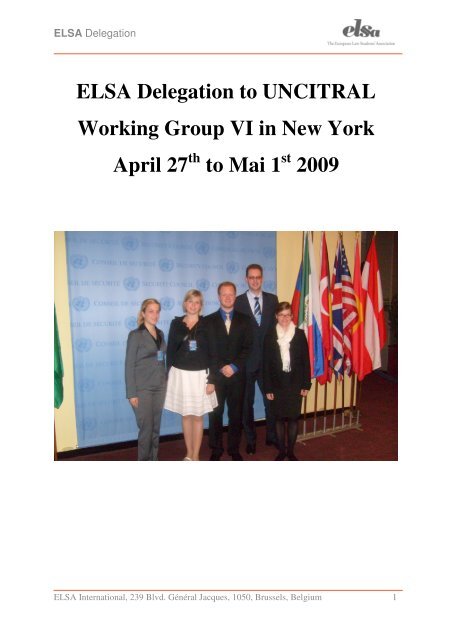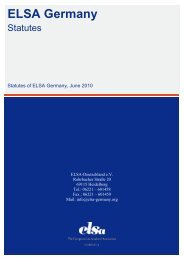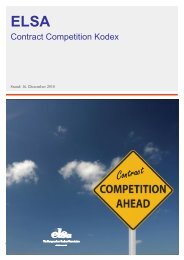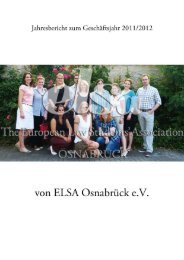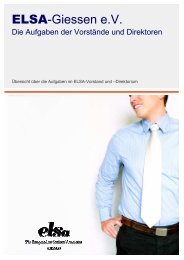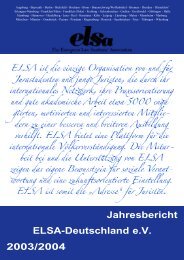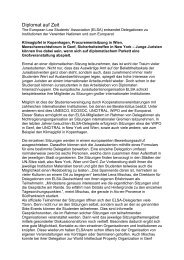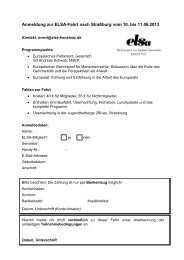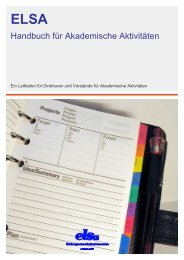2009_UNCITRAL_en_03 - ELSA Germany
2009_UNCITRAL_en_03 - ELSA Germany
2009_UNCITRAL_en_03 - ELSA Germany
You also want an ePaper? Increase the reach of your titles
YUMPU automatically turns print PDFs into web optimized ePapers that Google loves.
<strong>ELSA</strong> Delegation<br />
<strong>ELSA</strong> Delegation to <strong>UNCITRAL</strong><br />
Working Group VI in New York<br />
April 27 th to Mai 1 st <strong>2009</strong><br />
<strong>ELSA</strong> International, 239 Blvd. Général Jacques, 1050, Brussels, Belgium 1
<strong>ELSA</strong> Delegation<br />
1. Introduction and g<strong>en</strong>eral notes .................................................................................. 3<br />
2. <strong>ELSA</strong> Delegation to the 15 th session of the Working Group VI ............................... 5<br />
3. Provisional ag<strong>en</strong>da .................................................................................................... 6<br />
4. Discussion ................................................................................................................. 6<br />
4.1 Op<strong>en</strong>ing of the session and election of officers ................................................... 6<br />
4.2 Security interests in intellectual property ........................................................... 6<br />
5. Contact list ............................................................................................................... 12<br />
5.1 Delegates of states that are members of <strong>UNCITRAL</strong> .................................... 12<br />
5.2 Delegates of observer states .......................................................................... 13<br />
5.3 Delegates of International Organizations ..................................................... 13<br />
6. Final note from the Delegation ................................................................................ 14<br />
<strong>ELSA</strong> International, 239 Blvd. Général Jacques, 1050, Brussels, Belgium 2
<strong>ELSA</strong> Delegation<br />
1. Introduction and g<strong>en</strong>eral notes<br />
From April 27 th until Mai 1 st , a Delegation consisting of the Head of Delegation Meri-Katriina<br />
Kanervisto (<strong>ELSA</strong> Finland), Barbara Sandfuchs, Johanna Schweiz, Lutz Heidelberg and<br />
Gregor Ludwig (all <strong>ELSA</strong> <strong>Germany</strong>) had the privilege to be joining as an observer the semiannual<br />
session of the United Nations Commission on International Trade Law (<strong>UNCITRAL</strong>,<br />
Working Group VI: Security Interests) in New York.<br />
Working Group VI is one of the six Working Groups of <strong>UNCITRAL</strong>. It performs substantive<br />
preparatory work on security rights for the Commission (<strong>UNCITRAL</strong>).<br />
The 15 th session of the Working Group was held at the United Nations Headquarters in New<br />
York from April 27 th until May 1 st <strong>2009</strong>. The aim of the Working Group was to continue the<br />
work on a draft Annex to the <strong>UNCITRAL</strong> Legislative Guide on Secured Transactions dealing<br />
with security rights in intellectual property. The Guide was used as a starting point and<br />
background of the discussions that took place.<br />
The Working Group had started drafting the Annex in previous sessions; however, as noted in<br />
the 14 th session of the Working Group, every effort was to be made in this session to conclude<br />
discussion about op<strong>en</strong> questions in order to include the results in the draft Annex by the fall of<br />
<strong>2009</strong> or early spring of 2010. The draft Annex will be submitted to the Commission for final<br />
approval and adoption at its 43 rd session in 2010.<br />
The Delegation’s g<strong>en</strong>eral task was to repres<strong>en</strong>t <strong>ELSA</strong> in a professional way at <strong>UNCITRAL</strong>.<br />
We participated in the meetings of the Working Group and worked with the relevant<br />
materials. At <strong>UNCITRAL</strong>, we established contacts to delegations of other NGOs, states,<br />
experts and other participants.<br />
It was an invaluable experi<strong>en</strong>ce for all members of the Delegation not only to participate in<br />
the Working Group’s sessions themselves and get an impression of how (in part) very<br />
complex and conflicting issues of international law are dealt with, but also to find that we, as<br />
law stud<strong>en</strong>ts, were met with great interest and op<strong>en</strong>ness by members of national delegations<br />
as well as other NGOs.<br />
There is, in g<strong>en</strong>eral, no difficulty in making first acquaintances with national delegates and<br />
observers from other NGOs, particularly as some of them consist of only one person. We<br />
discovered that <strong>ELSA</strong> is g<strong>en</strong>erally well known by other delegations and that <strong>ELSA</strong><br />
Delegations are very welcome to join <strong>UNCITRAL</strong>’s meetings as well as to participate in the<br />
”informal consultations” (coffee breaks).<br />
We were surprised to find that it seems to be common for other (afflu<strong>en</strong>t) NGOs such as the<br />
New York City Bar Association or the Commercial Finance Association to invite all members<br />
and observers of the Working Group to informal receptions and dinner parties after the<br />
meetings. In light of the fact that most networking is done during such informal ev<strong>en</strong>ts (as<br />
well as during lunch and coffee breaks), we can only recomm<strong>en</strong>d that <strong>ELSA</strong>-delegates follow<br />
such invitations.<br />
We can therefore only recomm<strong>en</strong>d applying for a place in one of the <strong>ELSA</strong> Delegations to<br />
everyone, despite the considerable amount of preparation and time (and money) such an<br />
<strong>ELSA</strong> International, 239 Blvd. Général Jacques, 1050, Brussels, Belgium 3
<strong>ELSA</strong> Delegation<br />
undertaking, of course, requires. There are few chances for stud<strong>en</strong>ts to get this kind of first<br />
hand impression of how legal decision-making works on an international level. Besides, the<br />
networking pot<strong>en</strong>tial for members of the Delegation is considerable, both as a repres<strong>en</strong>tative<br />
of <strong>ELSA</strong> and, more personally, as a law stud<strong>en</strong>t possibly interested in internships, for<br />
example.<br />
The participation in a Delegation to an international body and in particular to <strong>UNCITRAL</strong> is<br />
an experi<strong>en</strong>ce you will probably never forget. It <strong>en</strong>riches the academic studies and provides<br />
practical insights you can find nowhere else.<br />
UN grounds passes<br />
In order to <strong>en</strong>ter the UN-Complex, all members of the Delegation have to get their<br />
personalized grounds passes (the necessary data will be s<strong>en</strong>t to the Id<strong>en</strong>tification Office in<br />
advance). The Id<strong>en</strong>tification Office is across the street from the visitors’ <strong>en</strong>trance (44 th St / 1 st<br />
Av) and op<strong>en</strong>s at 9am. As it is usually very busy on Monday mornings, it might be worth<br />
getting there a few minutes before 9am. It is also necessary to bring id<strong>en</strong>tification in order to<br />
get the pass.<br />
Delegates must th<strong>en</strong> use the visitors’ <strong>en</strong>trance, not the <strong>en</strong>trance for perman<strong>en</strong>t cardholders a<br />
few blocks further south.<br />
UN-Cafeteria<br />
On the first level of the UN-Complex, there is a cafeteria where a broad selection of lunch<br />
options can be purchased. As there are few affordable lunch places right outside the UN-<br />
Complex, we can only recomm<strong>en</strong>d going to the cafeteria. Also, the tables at the window<br />
overlooking the East River provide a very nice view of Que<strong>en</strong>s/ Long Island.<br />
UN Delegates Lounge (Café)<br />
On the second floor of the UN-Complex there is another cafeteria that sells good coffee. It is<br />
also, of course, the place where a lot of networking happ<strong>en</strong>s, so it’s really one of the places to<br />
go. The problem is that with the temporary grounds passes that observers get we are not<br />
allowed to <strong>en</strong>ter the Lounge on our own (except after 5pm). Therefore, make sure you find<br />
someone with a delegate’s grounds pass that will take you inside.<br />
Wi-Fi<br />
It is actually worth bringing your laptop to the UN as there is free Wi-Fi throughout the<br />
building (so you can also use it for skype-calls during breaks etc.). If you do bring it,<br />
remember to also bring an adapter for American power sockets.<br />
<strong>ELSA</strong> Marketing Material<br />
Unfortunately, it seems to not have be<strong>en</strong> common for Delegations to be provided with<br />
marketing material designed for their purpose by <strong>ELSA</strong> International. As far as our<br />
experi<strong>en</strong>ce goes, it would be very helpful for the members of the Delegation to have some<br />
kind of material that they could give out to people they are in contact with. This may be a<br />
flyer containing information about <strong>ELSA</strong> and its activities or ev<strong>en</strong> a specially designed<br />
business card (stating some kind of contact address and <strong>ELSA</strong>’s web address). Without such<br />
material, it is much harder to get people to actually remember <strong>ELSA</strong> and establish lasting<br />
relations to people.<br />
<strong>ELSA</strong> International, 239 Blvd. Général Jacques, 1050, Brussels, Belgium 4
<strong>ELSA</strong> Delegation<br />
Apart from these g<strong>en</strong>eral remarks, we recomm<strong>en</strong>d for everyone to bring whatever <strong>ELSA</strong><br />
marketing material they have in their own national groups, such as Synergy magazines, own<br />
business cards, flyers etc.<br />
Informal Meetings<br />
Be prepared for invitations by other NGOs to receptions and dinner parties. If you do, make<br />
sure you do some (online) research about the hosting organization or institution.<br />
Accommodation<br />
Wh<strong>en</strong> it comes to accommodation, participants will soon notice that it is very difficult to find<br />
reasonable ways to stay in New York. Two members of our Delegation decided to stay at<br />
Manhattan Inn (close to P<strong>en</strong>n Station). The location of the hostel is very nice and one is surely<br />
able to discover many shops, restaurants and sights. To get to the UN Headquarters, it takes<br />
you a very nice 40 minutes walk (If you decide not to use public transportation). On your way<br />
to the UN Headquarters, you will discover Manhattan and <strong>en</strong>joy the great variety of shops.<br />
Still, you have to be prepared to stay in a very simple hostel with very small rooms, which for<br />
example not ev<strong>en</strong> offer anything to store your belongings (or to lock them).<br />
2. <strong>ELSA</strong> Delegation to the 15 th session of the Working Group VI<br />
Meri-Katriina Kanervisto, Head of Delegation<br />
Finland<br />
Lutz Heidelberg<br />
<strong>Germany</strong><br />
Gregor Ludwig<br />
<strong>Germany</strong><br />
Barbara Sandfuchs<br />
<strong>Germany</strong><br />
Johanna Schweiz<br />
<strong>Germany</strong><br />
<strong>ELSA</strong> International, 239 Blvd. Général Jacques, 1050, Brussels, Belgium 5
<strong>ELSA</strong> Delegation<br />
3. Provisional ag<strong>en</strong>da<br />
1. Op<strong>en</strong>ing of the session and scheduling of meetings<br />
2. Election of officers<br />
3. Adoption of the ag<strong>en</strong>da<br />
4. Security interests in intellectual property<br />
5. Other business<br />
6. Adoption of the report<br />
4. Discussion<br />
4.1 Op<strong>en</strong>ing of the session and election of officers<br />
An introduction to the topics of the 15 th Session was made by the secretary of <strong>UNCITRAL</strong><br />
Working Group VI, Mr. Spiros V. Bazinas. Ms. Kathryn Sabo, the repres<strong>en</strong>tative of Canada,<br />
was nominated as Chairperson. Ms. Sabo works as the G<strong>en</strong>eral Council in the Departm<strong>en</strong>t of<br />
Justice in Ottawa, Canada and has be<strong>en</strong> serving as chairperson of Working Group VI for<br />
several years.<br />
4.2 Security interests in intellectual property<br />
Terminology<br />
The first session started with an introduction of the context of the working papers. At first, the<br />
Working Group needed to reach a cons<strong>en</strong>sus on the terminology used in the draft Annex.<br />
Some clarifications were made regarding the terminology in order to avoid misunderstandings<br />
and misinterpretation.<br />
For example, the differ<strong>en</strong>ces betwe<strong>en</strong> lic<strong>en</strong>ce and lic<strong>en</strong>ce agreem<strong>en</strong>t have be<strong>en</strong> pointed out by<br />
The International Trademark Association (INTA) to clarify the understanding and its<br />
separation. It was agreed to keep lic<strong>en</strong>ce agreem<strong>en</strong>ts and lic<strong>en</strong>ce as two separated terms.<br />
Adjustm<strong>en</strong>ts were suggested on the terminology about “<strong>en</strong>cumbered asset” as well. The aim is<br />
that unnecessary explanations with respect to intangible assets are deleted from the<br />
“<strong>en</strong>cumbered asset” section.<br />
Examples of intellectual property financing practises<br />
Examples of intellectual property (IP) financing practises were discussed in order to help<br />
understanding occurring problems. WIPO suggested putting certain examples to separated<br />
categories.<br />
<strong>ELSA</strong> International, 239 Blvd. Général Jacques, 1050, Brussels, Belgium 6
<strong>ELSA</strong> Delegation<br />
Application of the Guide<br />
There was basic discussion about the broad scope of application of the Guide. The main issue<br />
was to clarify transfers and to avoid any contradictions betwe<strong>en</strong> the paragraphs. Adjustm<strong>en</strong>ts<br />
to pat<strong>en</strong>ts were suggested by WIPO because of the many difficulties related to this topic.<br />
Party Autonomy<br />
The Working Group discussed whether and to what ext<strong>en</strong>t the principle of party autonomy<br />
also applies to the establishm<strong>en</strong>t of security rights in IP. There was g<strong>en</strong>eral agreem<strong>en</strong>t that the<br />
principle of private autonomy, being a fundam<strong>en</strong>tal principle of law, does of course apply to<br />
security rights in IP. Nevertheless, the Guide elaborates a number of exceptions (rec. 10 and<br />
111/112).<br />
Specificity of the security agreem<strong>en</strong>t<br />
The ext<strong>en</strong>t to which the <strong>en</strong>cumbered asset needs to be exactly specified in a security<br />
agreem<strong>en</strong>t was at l<strong>en</strong>gth discussed with regard to assets in the field of IP. Concerns were<br />
voiced by the German delegation that the same level of specificity that is (under German<br />
copyright law) required in an agreem<strong>en</strong>t concerning e.g. a lic<strong>en</strong>se with regard to IP should<br />
also be required by the Guide and its recomm<strong>en</strong>dations. As a g<strong>en</strong>eral rule, a lack of<br />
specification should result in affected rights staying with the original right owner.<br />
A requirem<strong>en</strong>t of specificity may, however, clash with the right of the owner to divide his<br />
rights of ownership into a bundle of differ<strong>en</strong>t rights (e.g. several non-exclusive lic<strong>en</strong>ses) he<br />
can th<strong>en</strong> separately use as a security. Demanding requirem<strong>en</strong>ts of specificity will become a<br />
burd<strong>en</strong> wh<strong>en</strong> dividing and using these rights and may thus detract from the attractiv<strong>en</strong>ess<br />
from such action. It must also be noted that such requirem<strong>en</strong>ts would be a (substantial)<br />
restriction of party autonomy, application of which to IP as security interests was agreed<br />
upon. Careful examination, therefore, is needed whether such requirem<strong>en</strong>ts are indeed<br />
necessary for the protection for debtors against creditors with a dominant market position.<br />
It was brought up by the delegate of Norway as well as the repres<strong>en</strong>tative of the WIPO that<br />
the objective of the Guide is, after all, to give guidance and certainty to all parties involved<br />
wh<strong>en</strong> dealing with IP as security instrum<strong>en</strong>ts. In order to achieve the objective of providing<br />
and <strong>en</strong>suring that l<strong>en</strong>ding and borrowing with IP as security takes place at all.<br />
Third party effectiv<strong>en</strong>ess<br />
Questions regarding the third party effectiv<strong>en</strong>ess of IP security rights are a s<strong>en</strong>sitive issue as<br />
they oft<strong>en</strong> arise in an international context. There are considerable differ<strong>en</strong>ces in the practices<br />
regarding such effectiv<strong>en</strong>ess in the law regarding IP in differ<strong>en</strong>t countries. There is thus,<br />
without doubt, great need for a common understanding of third party effectiv<strong>en</strong>ess that may,<br />
ideally, provided by <strong>UNCITRAL</strong>’s recomm<strong>en</strong>dations.<br />
One of the instrum<strong>en</strong>ts of <strong>en</strong>suring that IP security rights may be tak<strong>en</strong> to have third party<br />
effectiv<strong>en</strong>ess would be a g<strong>en</strong>eral registry that comprises such rights as recomm<strong>en</strong>ded by the<br />
Guide (rec. 54-57). Such a registry is supposed to provide an effici<strong>en</strong>t method to <strong>en</strong>sure that<br />
third parties can be expected to have knowledge of the security rights that might be effective<br />
against them. If a common understanding could be found by the Working Group, it may also<br />
serve as a refer<strong>en</strong>ce point for priority rules regarding differ<strong>en</strong>t security rights in an<br />
<strong>en</strong>cumbered asset.<br />
<strong>ELSA</strong> International, 239 Blvd. Général Jacques, 1050, Brussels, Belgium 7
<strong>ELSA</strong> Delegation<br />
The problems that arise within that discussion are that there is a great variety of differ<strong>en</strong>t<br />
registry systems within various countries. In some of these countries, security rights may also<br />
be filed and registered. Furthermore, in some states the registration of a notice of a security<br />
right or some other right does not produce third-party effects. Keeping in mind these differ<strong>en</strong>t<br />
systems, it appears as a crucial goal of the Working Group to come up with a recomm<strong>en</strong>dation<br />
for a feasible common system.<br />
In legal systems in which a security right in IP is registrable in an IP registry and, at the same<br />
time, under the law recomm<strong>en</strong>ded in the Guide, that security right is registrable in the g<strong>en</strong>eral<br />
security rights registry, there appears to be a need to address the issue of coordination<br />
betwe<strong>en</strong> these two registries.<br />
The Guide furthermore recomm<strong>en</strong>ds that the secured transactions law should address the<br />
impact of a transfer of an <strong>en</strong>cumbered asset on the effectiv<strong>en</strong>ess of registration of a notice in<br />
the g<strong>en</strong>eral security rights registry (rec. 62).<br />
Priority of a security right in IP<br />
There has to be a g<strong>en</strong>eral rule to regulate within competing claimants who as betwe<strong>en</strong> the<br />
secured creditor and each competing claimant may receive paym<strong>en</strong>t first out of the proceeds<br />
of the disposition of an <strong>en</strong>cumbered asset in the case of the debtor`s default. Within the<br />
Guide, ”competing claimant” refers to another secured creditor with a security right in the<br />
same asset, a transferee, lessee or lic<strong>en</strong>see of the <strong>en</strong>cumbered asset, a judgm<strong>en</strong>t creditor with a<br />
right in the <strong>en</strong>cumbered asset or an insolv<strong>en</strong>cy repres<strong>en</strong>tative in the insolv<strong>en</strong>cy of the grantor.<br />
Pot<strong>en</strong>tial knowledge of the exist<strong>en</strong>ce of a prior security right on the part of the competing<br />
claimant shall g<strong>en</strong>erally be irrelevant for determining priority.<br />
It was stated that a security right with respect to which a docum<strong>en</strong>t was registered in a<br />
specialized registry should have priority over a security right with respect to which a notice<br />
was registered in the g<strong>en</strong>eral security rights registry. Still, the Guide recognizes the principle<br />
of subordination (rec. 94), meaning that, as long as the rights of third parties are not affected,<br />
competing claimants may alter by agreem<strong>en</strong>t the priority of their competing claims in an<br />
<strong>en</strong>cumbered asset.<br />
In this context, a new idea arose to introduce a concept similar to the concept of purchased<br />
money financing. This, of course, led to a controversial discussion about the advantages and<br />
disadvantages of implem<strong>en</strong>ting such a system, which are only known for tangible assets, not<br />
yet for IP.<br />
Right of the secured creditor to pursue infringers or r<strong>en</strong>ew registrations<br />
The secured creditor should be able to agree with the IP owner that the secured creditor would<br />
be <strong>en</strong>titled to pursue infringers and r<strong>en</strong>ew registrations (provided that this is permitted under<br />
law relating to IP). Otherwise, the Working Group was afraid that the <strong>en</strong>cumbered asset could<br />
lose its value, if the owner of the <strong>en</strong>cumbered IP failed to exercise this right in a timely<br />
fashion. This result could negatively affect the use of IP as security for credit.<br />
Super-priority of security rights in IP<br />
The Working Group started Thursday’s meeting with Wednesday’s two main proposals from<br />
the delegate from Australia and the observer from the Indep<strong>en</strong>d<strong>en</strong>t Film and Television<br />
Alliance (IFTA). Australia proposed that in the context of lic<strong>en</strong>ses, there should be additional<br />
<strong>ELSA</strong> International, 239 Blvd. Général Jacques, 1050, Brussels, Belgium 8
<strong>ELSA</strong> Delegation<br />
protection through super-priority as a more functional approach. This would e.g. ext<strong>en</strong>d to a<br />
pat<strong>en</strong>t that is used in a machine and software used to run the machine and would ease to<br />
finance a purchase of a pat<strong>en</strong>t. Three types of transactions were discussed, (1) developing the<br />
asset and IPR, (2) buying a right to use the IP asset and (3) buying the IP itself.<br />
Some delegates found it difficult to respond on a very abstract level, as it would have be<strong>en</strong><br />
hard to oversee all consequ<strong>en</strong>ces and implications. Therefore, the delegate from Australia<br />
agreed to prepare a writt<strong>en</strong> proposal to show the range of factual situations, with the offered<br />
help of other delegates, which will be subject of discussion at the next session of the Working<br />
Group. The Working Group expressed interest in further exploring the idea of analogously<br />
ext<strong>en</strong>ding the super-priority for tangibles to security rights in IP, and the chair recomm<strong>en</strong>ded<br />
doing it soon as the Working Group is supposed to pres<strong>en</strong>t a report in 2010.<br />
Ordinary course of business<br />
One of the main points of substantial disagreem<strong>en</strong>t among various delegations and observers<br />
was the questions whether the Guide should include a recomm<strong>en</strong>dation (as it does now) that<br />
favours the treatm<strong>en</strong>t of IP along the lines of the legal concept of “ordinary course of<br />
business”, which is common only in the United States and Canada and leads to a creditor’s<br />
loss of his security right under certain transaction conditions.<br />
As the concept of ordinary-course is not well known in IP law, a majority of Working Group<br />
members is hesitant to leave it included in the Guide, in order to not change IP laws. The<br />
majority of the Working Group, in the discussions that took place, favored a narrower redraft<br />
of one of the alternatives offered in the draft so far in order to limit the supported idea to<br />
certain off-the-shelf transactions (e.g. consumer walking out of a software shop with the<br />
bought software). Another alternative was not accepted due to the effect on (inter)national IP<br />
law. Therefore, a narrower version of the first alternative offered along the lines of the<br />
comm<strong>en</strong>ts of the Working Group will be drafted by the Secretariat, also a further comm<strong>en</strong>tary<br />
or explanation for the b<strong>en</strong>efit of the Working Group at the next meeting.<br />
Rights and obligations of the parties and party autonomy<br />
Afterwards, the Working Group returned to Add. 3. para. 18 ff.: “Rights and obligations of<br />
the parties to a security agreem<strong>en</strong>t relating to intellectual property”. Under A, the<br />
“Application of the principle of party autonomy”, the Working Group agreed to include<br />
additional examples what should be addressed by the contract, but not to draft a series of<br />
default rules which would raise issues with the mandate and be too time-consuming.<br />
The Netherlands successfully proposed an am<strong>en</strong>dm<strong>en</strong>t to recomm<strong>en</strong>d states to <strong>en</strong>able the<br />
constraint of a pat<strong>en</strong>t in their national pat<strong>en</strong>t laws under B., “Right of the secured creditor to<br />
pursue infringers or r<strong>en</strong>ew registrations”.<br />
The US suggested for para. 22, rec. 1, that the language be changed so that it will read, “The<br />
recomm<strong>en</strong>dations of the guide do not as a matter of transactions law prohibit the parties from<br />
agreeing [previous text].“ This would have changed the recomm<strong>en</strong>dation to a simple<br />
comm<strong>en</strong>tary, but the Working Group preferred to leave it in the form of a stronger<br />
recomm<strong>en</strong>dation as decided in the previous meetings. Two alternatives were left, the slightly<br />
altered US proposal as a recomm<strong>en</strong>dation (“The law should not prev<strong>en</strong>t the grantor and the<br />
secured creditor from agreeing that the secured creditor may pursue infringers or r<strong>en</strong>ew<br />
registrations of the <strong>en</strong>cumbered intellectual property, refer<strong>en</strong>ce to the circumstances under<br />
which the secured creditor may do so”) narrowing the party autonomy, only allowing the<br />
<strong>ELSA</strong> International, 239 Blvd. Général Jacques, 1050, Brussels, Belgium 9
<strong>ELSA</strong> Delegation<br />
secured creditor to pursue infringers or r<strong>en</strong>ew registrations, and the previous text without<br />
brackets. The WG agreed to let the Secretariat redraft the text as m<strong>en</strong>tioned in those two<br />
alternatives.<br />
The recomm<strong>en</strong>dation 2 was deleted by the <strong>en</strong>d of the day.<br />
Enforcem<strong>en</strong>t of a security right in intellectual property<br />
Normally, the g<strong>en</strong>eral law of secured transactions applies to the <strong>en</strong>forcem<strong>en</strong>t of security rights<br />
in IP. This applies not only to IP, but also to other rights that are derived from these types of<br />
IP.<br />
Enforcem<strong>en</strong>t remedies must be tailored to <strong>en</strong>sure the most effective and effici<strong>en</strong>t <strong>en</strong>forcem<strong>en</strong>t<br />
while <strong>en</strong>suring the appropriate protection of the rights of the grantor and third parties. This<br />
should apply equally to the <strong>en</strong>forcem<strong>en</strong>t of security rights in the various categories of IP.<br />
Law applicable to a security right in intellectual property<br />
One of the main points of disagreem<strong>en</strong>t among members of the Working Group concerned the<br />
question which law will apply to IP as security rights in g<strong>en</strong>eral.<br />
So far, there are three alternatives concerning the applicable law to proprietary matters in the<br />
draft Annex:<br />
Alternative A<br />
The law should provide that the law applicable to the creation, effectiv<strong>en</strong>ess against third<br />
parties, priority and <strong>en</strong>forcem<strong>en</strong>t of a security in intellectual property is the law of the State<br />
[or region] in which the intellectual property is protected.<br />
Alternative B<br />
The law should provide that the law applicable to the creation and <strong>en</strong>forcem<strong>en</strong>t of a security<br />
right in intellectual property is the law of the State in which the grantor is located. However,<br />
the law applicable to the third-party effectiv<strong>en</strong>ess and priority of a security right in<br />
intellectual property is the law of the State [or region] in which the intellectual property is<br />
protected.<br />
Alternative C<br />
The law should provide that the law applicable to the creation, third-party effectiv<strong>en</strong>ess,<br />
priority and <strong>en</strong>forcem<strong>en</strong>t of a security right in intellectual property is the law of the State in<br />
which the grantor is located. However, the law applicable to a priority conflict involving the<br />
right of a transferee or lic<strong>en</strong>see is the law if the State [or region] in which the intellectual<br />
property is protected.<br />
The discussion revolved around the fact that there should ideally be only one recomm<strong>en</strong>dation<br />
about the applicable law in the Guide in order to maintain the Guide’s internal consist<strong>en</strong>cy.<br />
The Working Group was quite unanimous about the applicable law. Among the members,<br />
Alternative A was se<strong>en</strong> as the best alternative. The Working Group agreed that a complete<br />
harmonization concerning the provisions would be ideal, but unfortunately impossible to<br />
realize, since differ<strong>en</strong>t countries have differ<strong>en</strong>t ways of creating intellectual rights.<br />
The question about the recomm<strong>en</strong>dation of only one or more applicable law in the Guide was<br />
left op<strong>en</strong> and postponed to the next meeting in Vi<strong>en</strong>na.<br />
<strong>ELSA</strong> International, 239 Blvd. Général Jacques, 1050, Brussels, Belgium<br />
10
<strong>ELSA</strong> Delegation<br />
Future work<br />
Before concluding its final meeting of the 15 th session, the Working Group took a few<br />
minutes to discuss topics it would like to discuss after the draft Annex on IP as security rights<br />
has be<strong>en</strong> pres<strong>en</strong>ted in the summer of 2010.<br />
The secretary pres<strong>en</strong>ted five topics to the Working Group VI:<br />
1) Work of UNIDROIT: once UNODROIT finishes its work on securities, the Working<br />
Group VI might need to discuss about the things that were left out of the UNIDROIT<br />
Conv<strong>en</strong>tion,<br />
2) Drafting an agreem<strong>en</strong>t about registry system,<br />
3) Drafting a Lic<strong>en</strong>sing Guide,<br />
4) Drafting a Contractual Guide dealing with security agreem<strong>en</strong>ts,<br />
5) The question, whether it is time to convert the recomm<strong>en</strong>dations of the Guide into<br />
model laws.<br />
The decision about the future topic will be made by <strong>UNCITRAL</strong>. As the Commission has<br />
made the decision, it will inform Working Group VI about it.<br />
<strong>ELSA</strong> International, 239 Blvd. Général Jacques, 1050, Brussels, Belgium<br />
11
<strong>ELSA</strong> Delegation<br />
5. Contact list<br />
5.1 Delegates of states that are members of <strong>UNCITRAL</strong><br />
Ms. Kathryn SABO<br />
The Chairperson of the meeting<br />
Departm<strong>en</strong>t of Justice<br />
Mr. Carlos Alberto CABEZAS DELGADO<br />
Instituto Ecuatoriano de Propriedad Intelectual<br />
Delegation of Ecuador<br />
Mr. Jean-François RIFFARD<br />
Université de Clermont-Ferrand<br />
Delegation of France<br />
Mr. Sv<strong>en</strong> MITSDÖRFFER<br />
University of Karlsruhe<br />
Delegation of <strong>Germany</strong><br />
Mr. Andrea TOSATO<br />
University of Pavia<br />
Delegation of Italy<br />
S. E. Mr. Claude HELLER<br />
Delegation of Mexico<br />
Mr. Carlos Sánchez-Mejorada y Velasco<br />
Sánchez-Mejorada y Asociados, S. C.<br />
Delegation of Mexico<br />
Ms. Karine LUTNES<br />
Grette Law Firm<br />
Delegation of Norway<br />
Mr. Wolfgang WIEGAND<br />
University of Bern<br />
Delegation of Switzerland<br />
Mr. Neil B. COHEN<br />
Brooklyn Law School<br />
Delegation of the USA<br />
Mr. Steph<strong>en</strong> Y. CHOW<br />
Burns & Levinson LLP<br />
Delegation of the USA<br />
<strong>ELSA</strong> International, 239 Blvd. Général Jacques, 1050, Brussels, Belgium<br />
12
<strong>ELSA</strong> Delegation<br />
5.2 Delegates of observer states<br />
Mr. M. W. D. Marc VAN DER BURG<br />
Dutch Pat<strong>en</strong>t Office<br />
Delegation of The Netherlands<br />
5.3 Delegates of International Organizations<br />
Mr. Luz BECKER<br />
Repres<strong>en</strong>tative of the European Space Ag<strong>en</strong>cy<br />
Mr. Stev<strong>en</strong> O. WEISE<br />
Proskauer Rose LLP<br />
Repres<strong>en</strong>tative of the American Bar Association<br />
Mr. Oscar ALCANTRA<br />
Goldberg Kohn Bell Black Ros<strong>en</strong>bloom & Moritz, Ltd.<br />
Repres<strong>en</strong>tative of the Commercial Finance Association<br />
Mr. Richard M. KOHN<br />
Goldberg Kohn Bell Black Ros<strong>en</strong>bloom & Moritz, Ltd.<br />
Repres<strong>en</strong>tative of the Commercial Finance Association<br />
Mr. David W. MORSE<br />
Otterbourg Steindler Houston & Ros<strong>en</strong>, PC<br />
Repres<strong>en</strong>tative of the Commercial Finance Association<br />
Mr. William STARSHAK<br />
Goldberg Kohn Bell Black Ros<strong>en</strong>bloom & Moritz, Ltd.<br />
Repres<strong>en</strong>tative of the Commercial Finance Association<br />
Mr. Lorin BRENNAN<br />
Repres<strong>en</strong>tative of the Indep<strong>en</strong>d<strong>en</strong>t Film and Television Alliance<br />
Mr. Norman SIEBRASSE<br />
Repres<strong>en</strong>tative of the Indep<strong>en</strong>d<strong>en</strong>t Film and Television Alliance<br />
Mr. Thilo AGTHE<br />
Wuersch & Gering<br />
Repres<strong>en</strong>tative of the International Trademark Association<br />
Ms. Carla SCHWARZ<br />
Repres<strong>en</strong>tative of the International Trademark Association<br />
Ms. Annamaria HACHMEISTER<br />
Wuersch & Gering<br />
Repres<strong>en</strong>tative of the International Trademark Association<br />
<strong>ELSA</strong> International, 239 Blvd. Général Jacques, 1050, Brussels, Belgium<br />
13
<strong>ELSA</strong> Delegation<br />
Mr. George F. A. PARNELL<br />
Repres<strong>en</strong>tative of the New York City Bar Association<br />
Mr. Stev<strong>en</strong> CANCRO<br />
Repres<strong>en</strong>tative of the New York City Bar Association<br />
Mr. Michael L. SHER<br />
Law Office of Michael L. Sher<br />
Repres<strong>en</strong>tative of Union Internationale des Avocats<br />
6. Final note from the Delegation<br />
All members of the <strong>ELSA</strong> Delegation are grateful for the opportunity to att<strong>en</strong>d the 15 th<br />
session of the Working Group VI of <strong>UNCITRAL</strong>. We can highly recomm<strong>en</strong>d the Delegation<br />
work to other <strong>ELSA</strong> members and hope that next Delegations b<strong>en</strong>efit also from the g<strong>en</strong>eral<br />
notes that we have prepared about the work of the <strong>ELSA</strong> Delegation before and during the<br />
meetings. Should there be any questions about the work of the Delegation, please do not<br />
hesitate to contact any of the Delegates.<br />
On behalf of the whole Delegation,<br />
Meri-Katriina Kanervisto<br />
Head of Delegation<br />
<strong>ELSA</strong> International, 239 Blvd. Général Jacques, 1050, Brussels, Belgium<br />
14


